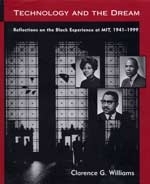Technology and the Dream: Reflections on the Black Experience at MIT, 1941-1999, a new book by Clarence G. Williams, adjunct professor of urban studies and planning, provides 175 oral histories in two media (text and CD) to portray the experiences of black students, faculty, administrators and staff at MIT.
"Bridge leaders," nonblack faculty and administrators who have been "instrumental in making MIT a more welcoming, nurturing environment for blacks and other minorities," are included in Professor Williams's 1,000-page book published this month by the MIT Press.
President Charles M. Vest commented on Technology and the Dream in his presentation at MIT's 27th annual breakfast to honor the legacy of Martin Luther King Jr.
"This truly extraordinary volume holds over half a century of lessons for our future. It is a book about the experiences and accomplishments of individuals, but, more deeply still, it is about MIT. It is about both triumph and failure. It is about the complexity of life and race. It is about injustice and about thoughtless, unintended injuries," he said.
"But Technology and the Dream is also about the value of an MIT education and about life lessons -- both pleasant and unpleasant -- that lead to growth. It is about perseverance, pride, determination and personal accomplishment. It is about how things look to a student and how they look to that same person years later. It is a book that simultaneously gives us hope, pride and inspiration, yet says how slowly many important things have changed. It displays, for all to see, the gap between where we are and where we ought to be in our quest for an inclusive, just society," President Vest said.
Technology and the Dream opens with an essay by Professor Williams. He describes himself as becoming "a participant in the story of the evolution of social and racial perspectives in an institution of higher learning" in 1972, when he came to work at MIT as assistant dean of the Graduate School. In 1974 he became special assistant to the president and chancellor for minority affairs.
He wrote Technology and the Dream to "give voice to members of the MIT community, both black and non-black, whose reflections on race and issues of race at the Institute are sharp, poignant and instructive. [They] have much to teach us about past, present and future strategies to deal with race and racism in the academic context.
"I offer this book -- this collection of voices, as it were -- in recognition of the fact that human relationships are integral to the success of an institution like MIT, and in the hope that future generations will not just meet but exceed our standards and expectations," he writes.
Like most of the men and women he interviewed for Technology and the Dream, Professor Williams has found both fulfillment and frustration in his years at MIT.
"I have found the most joy in teaching a course -- "Bridging Cultural and Racial Differences" -- offered in the Department of Urban Studies and Planning. We explore a range of issues, trying to understand the origins of racism and developing strategies for conflict resolution," he writes.
While "never forgetting how things could or should be in a better world," Professor Williams also writes candidly about his discouragement with the pace of wider opportunities for blacks at MIT.
"I would single out one area -- monitoring and promoting equal opportunity -- as the most frustrating in my nearly three decades at MIT. The problem is partly structural, partly indifference or hostility on the part of non-black faculty and partly insufficient pressure from the minority community on the leadership at the departmental and central administrative levels," he writes.
The interviews are arranged chronologically, beginning with Victor L. Ransom (SB 1948) and ending with Melissa Nobles, who came to MIT in 1995 and became associate professor of political science in 1999.
Included in the 50-year mix are in-depth interviews with UN Secretary General Kofi Annan (SM 1972, management); Rensselaer Polytechnic Institute president Shirley Jackson (PhD 1973); James Gates Jr. (PhD 1977), professor of physics at MIT; James H. Williams Jr. (SM 1968), professor of mechanical engineering at MIT; Mel King, founding director of the MIT Community Fellows Program; Paul E. Gray (ScD 1960), president of MIT from 1980-90, and President Vest.
Technology and the Dream also has interviews with Darcy Prather (SB 1991) the first black undergraduate degree holder to be named a Rhodes Scholar; Hubert "Hubie" Jones, who taught at MIT from 1972-77 and who appears each Sunday morning on WCVB-TV's "Five on Five"; Willard Johnson, professor of political science at MIT from 1974-96, and a leading figure in Boston urban development; and Lynda Jordan (PhD 1995 in chemistry), one of the few Boston urban minority high school students to obtain a doctorate from MIT.
Each interviewee was asked to discuss family background, education, role models and mentors, experiences of racism and race-related issues, adjustment to MIT, environment, and best and worst MIT experiences. Each was also invited to advise present or potential MIT students and the MIT administration on strategies for success in diversity, community and equality of opportunity.
Professor Williams is also the editor of Reflections of the Dream, 1975-1994: Twenty Years Celebrating the Life of Dr. Martin Luther King Jr. at the Massachusetts Institute of Technology.
A version of this article appeared in MIT Tech Talk on February 14, 2001.







